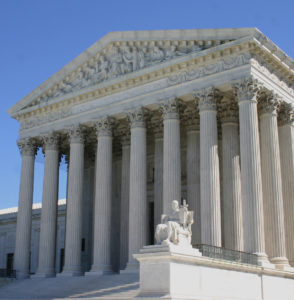Patent Eligibility of Medical Diagnostics Still Cloudy — Supreme Court Won’t Shed Light on Controversial Sequenom Ruling
Jun 30th, 2016 by Jessica Miles | News | Recent News & Articles |
 The Supreme Court has denied the petition for certiorari in Ariosa v. Sequenom, dashing hopes that it would reconsider the patent subject matter eligibility strictures on medical diagnostics and other technologies established by the scope of its Myriad, Mayo, and Alice rulings. As we reported previously, Sequenom petitioned the court in March of this year, asking:
The Supreme Court has denied the petition for certiorari in Ariosa v. Sequenom, dashing hopes that it would reconsider the patent subject matter eligibility strictures on medical diagnostics and other technologies established by the scope of its Myriad, Mayo, and Alice rulings. As we reported previously, Sequenom petitioned the court in March of this year, asking:
Whether a novel method is patent-eligible where: (1) a researcher is the first to discover a natural phenomenon; (2) that unique knowledge motivates him to apply a new combination of known techniques to that discovery; and (3) he thereby achieves a previously impossible result without preempting other uses of the discovery?
The Court’s denial ends a nearly three-year litigation battle over US Patent No. 6,268,540, which was issued to Sequenom for a noninvasive, prenatal diagnostic. The District and Federal Circuits had found the patent invalid. Interestingly, even the Federal Circuit decision indicated they were not comfortable with their ruling, with Judge Linn opining, “But for the sweeping language in the Supreme Court’s Mayo opinion, I see no reason, in policy or statute, why this breakthrough invention should be deemed patent ineligible.”[i]
Sequenom’s petition to the Supreme Court went to the very heart of Linn’s reluctant decision. It is also interesting that Sequenom raised the question of preemption in its petition, as the Federal Circuit held that the absence of preemption in this case was not sufficient for patentability.
Underscoring the widespread interest in the case and concern that the Court’s rulings jeopardize innovation, over 20 amicus briefs were filed, including those from industry giants Eli Lilly, Pfizer, Microsoft, and Novartis, as well as from law professors, law organizations, and biotech affinity groups. The Court’s denial of the petition is particularly concerning because the underlying patent claims and the questions to be addressed were set forth carefully and clearly to elicit meaningful guidance from the Court.
With no immediate remedy in sight for innovators and IP practitioners, some are looking to Congress for relief.[ii] In the interim, the status quo endures.
[i] Ariosa Diagnostics, Inc. v. Sequenom, Inc., 788 F.3d 1371 (Fed. Cir. 2015)
[ii] http://www.ipwatchdog.com/2016/06/27/70409/id=70409/
– Jessica Miles and Anthony D. Sabatelli, PhD, JD
This article is for informational purposes, is not intended to constitute legal advice, and may be considered advertising under applicable state laws. The opinions expressed in this article are those of the author only and are not necessarily shared by Dilworth IP, its other attorneys, agents, or staff, or its clients.

